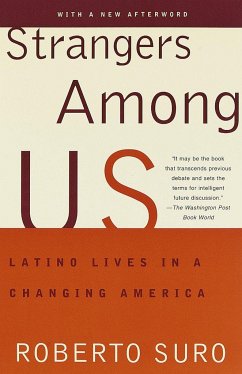Strangers Among Us is a lucid, informed, and cliché-shattering examination of Latino immigration to the United States--its history, the vast transformations it is fast producing in American society, and the challenges it will present for decades to come. In making vivid an array of people, places, and events that are little known to most Americans, the author--an American journalist who is himself the son of Latino immigrants--makes an often bewildering phenom-enon vastly more understandable. He tells the stories of a number of large Latino communities, linked in a chronological narrative that starts with the Puerto Rican migration to East Harlem in the 1950s and continues through the California-bound rush of Mexicans and Central Americans in the 1990s. He takes us into the world of Mexican-American gang members; Guatemalan Mayas in suburban Houston; Cuban businessmen in Miami; Dominican bodega owners in New York. We see people who represent a unique transnationalism and a new form of immigrant assimilation--foreigners who come from close by and visit home frequently, so that they virtually live in two lands. Like other groups of immigrants who preceded them onto American shores, Latinos, as they begin to find a place for themselves here, are changing the way this nation thinks of itself. These are people who defy easy categorization: they are neither white nor black; their households often include both legal and illegal immigrants; most struggle toward some kind of economic stability, but so many others fall short that they have become the new face of the urban poor. Some Latinos endure the special poverty of people who work long hours for wages that barely ensure survival. Their children grow up learning more from their televisions than from their teachers, knowing what they want from America but not how to get it. Looking to the future, we see clearly that the sheer number of Latino newcomers will force the United States to develop new means of managing relations among diverse ethnic groups and of creating economic opportunity for all. But we also see a catalog of conflict and struggle: Latinos in confrontation with blacks; Latinos wrestling with the strain of illegal immigration on their communities; Latinos fighting the backlash that is denying legal immigrants access to welfare programs. Critical both of incoherent government policies and of the failures of minority-group advocacy, the author proposes solutions of his own, including a rejection of illegal immigration by Latinos themselves paired with government efforts to deter unlawful journeys into the United States, and a new emphasis on English-language training as an aid to successful assimilation. Roberto Suro has written a timely, controversial, and hugely illuminating book.








